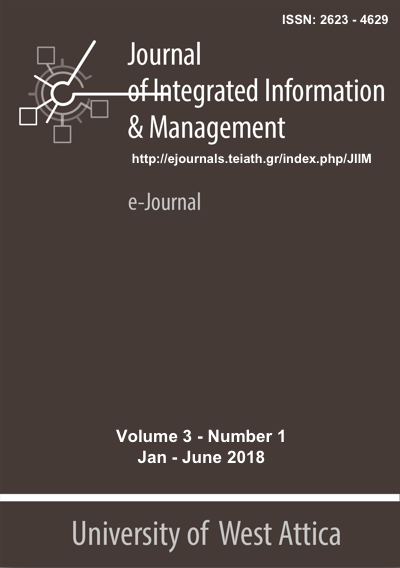Towards Reinvigorating Academic Library Use Data Capabilities: a Library and Information Science Senior Student Workshop Experience

Abstract
Purpose - This paper seeks to encourage reflections on the extent to which a one-shot workshop can help about-to-be information Professionals understand and appreciate the gamut of complexities and challenges associated with library position in the emerging Learning Analytics (LA) ecosystem.
Design/methodology/approach – It focuses on the description of the experience in organizing a workshop at the Department of Archival, Library & Information Studies (ALIS) of the University of West Attica. Building upon desk and primary research findings, organizers envisioned providing a valuable opportunity for senior students to collaboratively help identify the hidden value of student generated data for the support of their success and retention. Analyses of lessons learned, student viewpoints and
recommendations for the future, all aim contributing knowledge to the meta-community of Higher Education library professionals that are exploring ways to streamline their smooth integration into the educational process taking full advantage of new ICT capabilities.
Findings - Students seemed to have quickly developed a substantial understanding of risks and opportunities involved in this type of innovation as reflected on detected differences between a set of pre and post-workshop survey indicators. Furthermore, student evaluations on workshop design, delivery and content quality have provided valuable input on its usefulness and a set of recommendations for change.
Originality/value - It presents and analyses observations of the first Greek LIS community initiation experience to current Learning Analytics landscape, a topic germane to university libraries that could eventually influence New Information Professionals’ mindset and aspirations.
Article Details
- How to Cite
-
Sant-Geronikolou, S., Koulouris, A., & Kouis, D. (2018). Towards Reinvigorating Academic Library Use Data Capabilities: a Library and Information Science Senior Student Workshop Experience . Journal of Integrated Information Management, 3(1), 7–13. Retrieved from https://ejournals.epublishing.ekt.gr/index.php/jiim/article/view/37826
- Section
- Research Articles

This work is licensed under a Creative Commons Attribution-NonCommercial 4.0 International License.
Copyright Notice
Authors who publish with JIIM agree to the following terms:
- Authors retain copyright and grant the journal right of first publication with the work simultaneously licensed under a Creative Commons Attribution Non-Commercial License that allows others to share the work with:
- An acknowledgment of the work's authorship and initial publication in this journal.
- Authors are permitted and encouraged to post their work online (preferably in institutional repositories or on their website) prior to and during the submission process, as it can lead to productive exchanges, as well as earlier and greater citation of published work.





